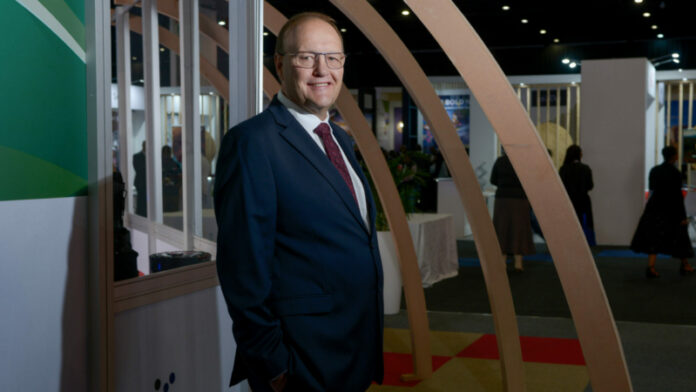
GOLD Fields said Ghana’s $3bn credit agreement with the International Monetary Fund in May had derisked its proposed joint venture with AngloGold Ashanti which requires the West African government’s approval.
The joint venture between Gold Fields’s Tarkwa mine in Ghana and the adjacent Iduapriem, owned by AngloGold Ashanti, will create Africa’s largest gold mine, cut costs, and extend the years of operation. But it requires the approval of Ghana’s government.
The country has been offered a 10% stake in the joint venture which Gold Fields will control and operate through a 60% stake. In return, the miners are hoping Ghana will give its approval to a development agreement for the combined mines.
However, a negotiation is required which, prior to Ghana easing its national debt worries, posed an element of deal risk to the joint venture, said Martin Preece, CEO of Gold Fields. “If you had asked me 2.5 weeks ago, I would have been more concerned,” he said in an interview on May 26.
“But Ghana got the IMF bailout which should relieve pressure. Tarkwa is a rare opportunity that everyone wants. AngloGold wins, we win, Ghana wins, the community wins.”
The combined mine is slated to produce 600,000 ounces of gold annually over 18 years of life. All-in sustaining costs (AISC) would be below $1,000/oz over the first five years of operation, and $1,200/oz over the life of mine.
While the IMF bailout won’t necessarily end Ghana’s debt worries – born partly of government’s overspend – it will enable Ghana to bolster is budget and balance of payments, Bloomberg News said. In terms of the agreement, $600m will be disbursed to the country immediately.
Debt pressure on Ghana resulted in it leaning on its gold industry to sell it gold. Preece confirmed Gold Fields had sold 15,000 ounces to Ghana last year, but said that the volume of gold sold in future years would be negotiated.
“They’re aiming for 10% [of Gold Fields’s Ghana production], but they’re still trying to bed it down. We’ve negotiated; they’re busy finalising negotiations how many ounces we’ll give them this year,” said Preece.
“It has no impact on us,” he added. “We’ve agreed to sell certain gold to them, we get the spot price, it’s converted into cedis; we have to take cedis into the country, paying for local suppliers and wages so we’re not having more cedis than we require at the moment. We’re very comfortable with where we are.”
Preece described Ghana as a stable country. “You don’t have people who are hungry, who don’t have fuel or don’t have electricity. You’ve just got this big debt crisis they’re trying to resolve,” he said.











